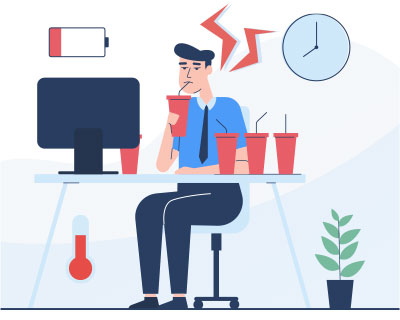Prolonged sitting poses a health hazard like smoking and is a major risk factor for many diseases.
The more you sit, the more you put yourself at risk for serious illness. Experts believe that prolonged sitting can increase the risk of cancer, diabetes, cardiovascular disease and back pain. Sitting turns off the electrical activity in the legs, making the body less sensitive to insulin and not burning enough calories. This slows down the metabolism.
Sitting for hours can lead to changes in the brain that can cause memory problems. The researchers at the University of California, Los Angeles found that sitting too much, like smoking, increases the risk of heart disease, diabetes mellitus and premature death. It also affects memory formation.
The researchers explain that a sedentary lifestyle can lead to thinning of the medial temporal lobes. This thinning may be a precursor to cognitive decline and dementia in middle-aged and older adults. By moving around frequently, you can reduce the negative effects of sitting.
According to a study by Columbia University's Irving Medical Center , published online in the American Journal of Epidemiology, replacing half an hour of sitting with physical activity of any intensity and duration reduces the risk of early death by up to 35 percent.
Sitting is a major risk factor for the health disorders
The researchers at Columbia University Medical Center found that sitting for long periods of time (12 or more hours a day), especially without getting up within 60 to 90 minutes, increases the risk of early death.
Below we look at some health risks associated with prolonged sedentary life.
Sitting all the time can make you fat
The body burns fewer calories when sitting than when standing. This increases your risk of obesity, which in turn puts you at risk for various health disorders. To avoid this, you need to move every 30 minutes.
Sitting for a long time can be a cause of hip and back pain
According to scientists from the National Institute of Arthritis and Musculoskeletal and Skin Diseases , back pain is a very common health problem today. Sitting all the time can put undue stress on your back. A slouched sitting position affects the joints, muscles and intervertebral discs. This causes severe pain and can lead to premature breakdown of cartilage and bone. Sitting also causes your hip flexors to shorten. This can cause problems with the hip joints.
Sitting a lot can increase the risk of cancer
Prolonged sitting increases the risk of breast, colon, lung, prostate and ovarian cancer. It also increases the risk of endometrial cancer. Researchers think this could be due to the presence of a C-reactive protein, which is present at higher levels in people who sit for long periods of time.
In fact, researchers at the American Cancer Society explain that even mild activity reduces the risk of premature death from cancer in less active adults. This can increase the chances of surviving cancer by almost 50 percent.
Sitting can increase the risk of cardiovascular disease
Sitting for too long increases your risk of cardiovascular disease by almost 34 percent. There are higher chances of developing heart failure with a sedentary lifestyle than with an active lifestyle. According to a study by the University of South Carolina's Arnold School of Public Health , men who sat more than 23 hours a week had a 64% higher risk of dying from heart disease than men who sat less than 11 hours a week sat.
Diabetes is a real health hazard
The more active you are, the better your triglyceride levels are. If the triglyceride levels are elevated, the risk of diabetes mellitus increases. University of Leicester researchers claim that sitting for long periods increases the risk of diabetes, heart disease and death.
Sitting all the time can lead to varicose veins
Sitting for a long time can cause blood to pool in the legs. This creates varicose veins. While this is not a dangerous condition, it can still cause blood clots, which can cause serious problems like deep vein thrombosis. When deep vein thrombosis is present, a blood clot forms in the main deep veins. Left untreated, the thrombosis can trigger a life-threatening pulmonary embolism.
From the category: Where, how and what drugs to buy?
Last updated on 24.05.2022







